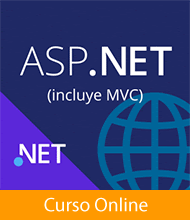
Ahí van los enlaces recopilados durante la semana pasada. Espero que os resulten interesantes. :-)
Por si te lo perdiste...
- Streaming en gRPC, parte I: Streaming unidireccional
José María Aguilar - Variables locales implicítamente tipadas en C#
José María Aguilar
.NET Core / .NET
- Announcing .NET 7 Preview 3
Jon Douglas - Nullable reference types in C# - Migrating to nullable reference types
Maarten Balliauw - Getting Disk information in Windows with C#
Bruno Sonnino - Reflected Image in C# with GDI and Unchecked Code
AdventureDriver - .NET Automatic Updates for Server Operating Systems
Jamshed Damkewala - Keeping up with .NET: learning about new features and APIs
Andrew Lock - Adding Alt Text To Twitter Images Using C#
Khalid Abuhakmeh - Warning on lower case type names in C# 11
Jared Parsons - Faster .NET development on Kubernetes with Skaffold
Salvatore Merone - Introducing Central Package Management
Jeff Kluge - Using the Roslyn APIs to Analyse a .NET Solution
Steve Gordon - Deep C# - Interface
Mike James - Discussing alternative memory management strategy for .NET
Mark Pelf - Dissecting AutoMapper Programming Horror
Jimmy Bogard - Ignoring JSON Key Casing and Numbers as Strings when Deserializing with System.Text.Json
Bryan Hogan
Publicado por José M. Aguilar a las 8:59 a. m.
Etiquetas: enlaces

Ahí van los enlaces recopilados durante la semana pasada. Espero que os resulten interesantes. :-)
Por si te lo perdiste...
- Ojo con la inicialización de propiedades usando expression bodied members
José María Aguilar - 13 Consejos para comentar tu código
José María Aguilar
.NET Core / .NET
- .NET Framework 4.5.2, 4.6, and 4.6.1 will reach End of Support on Apr 26, 2022
Jamshed Damkewala - How to prevent Email HTML injection in C# and .NET
Niels Swimberghe - Implementing OAuth2 Client credentials flow APP to APP security using Azure AD non interactive
Damien Bowden - GDI/User Object Leak Tracking – The Easy Way
Alois Kraus - Creating and Using HTTP Client SDKs in .NET 6
Oleksii Nikiforov - Must-Know Concepts Related to LINQ and IEnumerable
Ioannis Kyriakidis - How segments and regions differ in decommitting memory in the .NET 7 GC
Maoni Stephens - C# Pattern Matching Explained
Patrick Smacchia - C# Tip: Use Debug-Assert to break the debugging flow if a condition fails
Davide Bellone - Value types and exceptions in .NET profiling
Christophe Nasarre - Forcing HttpClient to use IPv4 or IPv6 addresses
Gérald Barré - Challenge: Why is this code broken?
Oren Eini - Speed Up Logging in .NET
David McCarter

Al hilo del post Cómo recibir un JSON como string en una acción ASP.NET Core MVC, el amigo Alberto dejaba una interesante pregunta en los comentarios: ¿y si una vez hemos recibido el string, queremos validar que sea un JSON válido?
Obviamente, una forma sencilla sería intentar deserializarlo por completo a la clase de destino, siempre que ésta sea conocida. Para ello podríamos utilizar el método Deserialize<T>() del objeto JsonSerializer de System.Text.Json, disponible en todas las versiones modernas de .NET, de la siguiente manera:

Ahí van los enlaces recopilados durante la semana pasada. Espero que os resulten interesantes. :-)
Por si te lo perdiste...
- Evitar el postback al pulsar un botón en ASP.Net
José María Aguilar - Implementación de servicios gRPC con ASP.NET Core
José María Aguilar
.NET Core / .NET
- What’s up with TimeZoneInfo on .NET 6? (Part 2)
Jon Skeet - Using PowerPoint as a WYSIWIG Editor for HTML Templates (Proof of Concept in C#)
Roland Weigelt - Search videos through the YouTube Data API from C#
Thomas Ardal - Converting code to the new Regex Source Generator
Gérald Barré - Tracking down a hanging xUnit test in CI: building a custom Test Framework
Andrew Lock

A veces, sobre todo en aplicaciones muy grandes, con las definiciones de rutas muy complejas o cuando nos toca analizar aplicaciones ajenas, puede ser interesante saber qué punto del código está procesando una petición determinada, ya sea un endpoint definido usando Endpoint Routing o Minimal APIs o bien sea una acción de un controlador MVC.
En este post vamos a ver cómo conseguirlo de forma muy sencilla, mediante la implementación un pequeño middleware que, insertado en el pipeline, añadirá en el encabezado información sobre el handler que generó la respuesta de la petición actual.

Ahí van los enlaces recopilados durante la semana pasada. Espero que os resulten interesantes. :-)
Por si te lo perdiste...
- Otro uso para la arroba (@) en C#
José María Aguilar - Cómo hacer que Fiddler inicie sin capturar conexiones
José María Aguilar
.NET Core / .NET
- .NET type for personally identifiable information (PII)
Vladimir Gaevoy - Performance benefits of sealed class in .NET
Gérald Barré - Building a NuGet Packages Architecture Part 5 – Service Registration Methods
Imar Spaanjaars - How to prevent email HTML injection in C# and .NET
Niels Swimberghe - Creating a Windows Service with .NET 6
Christian Nagel - Just because you stopped waiting for it, doesn't mean the Task stopped running
Andrew Lock - Unit Tests For Legacy Systems with .NET 6
Khalid Abuhakmeh - Get ready for NativeAOT in .NET 7
Maourice Gonzalez - Building NServiceBus Metrics with OpenTelemetry and System.Diagnostics.Metrics
Jimmy Bogard - Remove Time from a DateTime Object in C#
Code Maze - How to use pub/sub in C# .NET to build a chat app
Marc Duiker - How segments and regions differ in decommitting memory in the .NET 7 GC
Maoni Stephens














